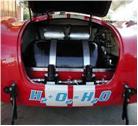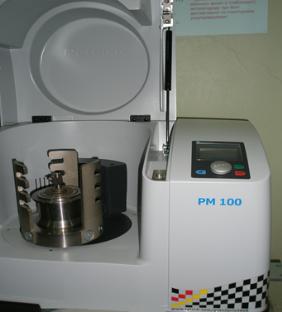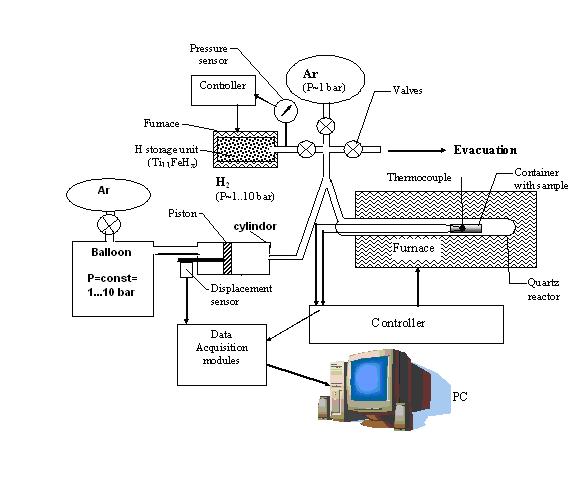
Target complex Programme for Research of NAS UKRAINE
Hydrogen alternative energy and new technologies
Home |
I.Hydrogen production |
II.Hydrogen Storage |
III.The use of hydrogen |
Development of hydrogen-sorption materials for their practical use in energy and new technologies as hydrogen storages, cathodes and anodes of electrochemical cellsThe project is aimed to solve the problem of getting to the needs of the hydrogen energy highly efficient hydrogen energy storage materials, namely hydrides of magnesium alloys that decompose at low temperatures and thus possess a combination of properties such as high hydrogen storage capacity and cyclic stability during rapid kinetics of sorption-desorption of hydrogen. Therefore, the aim of one of the project tasks is lowering thermal stability of hydride phases of Mg-based mechanical alloys by choice and optimization of the composition and conditions of their deriving as well as by their dispersion and mechanical alloying.
The hydrogen energy is the main field of application of hydrogen-sorption materials developed during the project fulfillment. It is also expected using the developed hydrogen-sorption materials based on magnesium and its alloys in laboratory installations for thermal hydrogen desorption researches, in high-power modules of energy convertors and hydride heat pumps, etc.
In the project part devoted to developing methods of deriving and improving the properties of hydrogen-sorption materials for hydrogen storage alloys based on magnesium, it is planned to carry out researches aimed at obtaining complex characteristics of these materials necessary for their practical application as hydrogen batteries and in the first place, fast kinetics and low temperature of full hydrogen release at a pressure 1 bar. To achieve the specified improving performance of the obtained materials, we plan to use new synthesis methods (mechanical and reactive mechanical alloying) as well as to involve processes of mechanical alloying and dispersion, which allow to change and generate needed hydrogen-sorption properties and thermal stability of the hydride phases and required chemical state of their surfaces through effects on electronic and thermodynamic properties. It is planned to make mechanical synthesis of magnesium-based alloys with different composition of alloying elements, in particularly Mg-Al, Mg-Ti, Mg-Fe, Mg-Al-Ti, Mg-Al-Fe, and Mg-Al-Ni alloys. The optimal composition of alloys and their synthesis conditions providing improved complex of specified essential characteristics will be determined.
It is expected that results of the project studies of the effect of different alloying elements and different synthesis conditions on hydrogen-sorption properties, thermal stability and kinetics of hydrogen desorption process of mechanical alloy composites based on Mg enable improved mechanical-chemical methods used to obtain materials for hydrogen storage and to optimize conditions of their synthesis. The results will improve a number of characteristics of practice needs (hydrogen capacity and cyclic stability, kinetics of hydrogen sorption-desorption, thermal stability and decomposition temperature of the hydride phase).
It has been established that mechanical alloying of magnesium by Al, Ni, and Ti gives best hydrogen-sorption characteristics and kinetics of hydrogen desorption from MgH2 hydride phase of a mechanical alloy-composite in comparison with that alloying by Fe. As a result of reactive milling within 10 hours the mixtures Mg + 10 wt%. Al + 10 wt.% Ti ; Mg + 10 wt%. Al +10 wt.% Ni, we have achieved bigger value of hydrogen capacity (6.57 wt.%H2 , 5.57 wt.%H2) than in the case of reactive milling (10 h) of mixture of Mg + 10 wt.% Al + 10 wt%. Fe (3.5% wt. H2). Temperature of the beginning of first H2 desorption from MgH 2 hydride phase of the both mechanical alloys was found to be 285 °C. Temperature of the beginning of H2 desorption from the hydride phase of the alloy obtained by grinding the mixture Mg + 10 wt%. Al +21 wt.% Ni in Ar atmosphere after the 1st hydrogenation was found to be 250 °C at a pressure of hydrogen in the reactor 1 bar. This ensured the formation of a solid solution of Al and Ni in magnesium.
G.V. Karpenko Physico-mechanical institute, Lviv
|
||||||
|
|
Teл. +38(044)-390 11 23



 Dr. Valennyn Dobrovolsky D.
Dr. Valennyn Dobrovolsky D. Dr. Оlga Ershova G.
Dr. Оlga Ershova G.